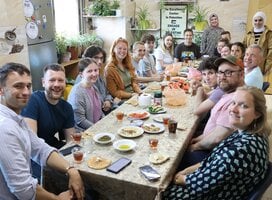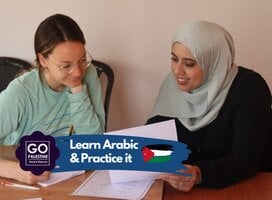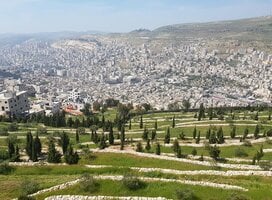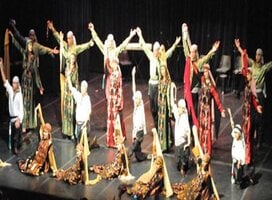Arabic Language Schools in Palestine
Are you a master of languages? Or are you trying to become one? Perhaps you just have the need to communicate with people in Arabic? No matter the reason, if you want to learn the Arabic language, going abroad to Palestine to learn it is totally possible! Plus, there's no more effective way to learn a language than by completely immersing yourself in it.
If you're in the midst of earning your degree and want to study the Arabic language at a university, that's an option. If you want to learn the language and don't want to be enrolled in a university, that's also possible. Between language centers, private companies, and universities, there is an option for everyone no matter the skill level.
Also, contrary to popular misconception, there are many cities in Palestine that are safe and welcoming to visit. Here's our guide, with all the logistics worked out for you.
If you're considering going to Palestine to learn Arabic, I have good news and I have bad news about the course types you'll have to choose from. The good news is you have multiple options and the bad news is you have multiple options. Having options is good, but if you're like me, decision making may not be your strongest skill. Luckily, Go Overseas has all the information you need.
Dialects
With Arabic, just like any other language, there are various dialects. While there are similarities between the dialects, there will also be differences. During your stay in Palestine, you'll most likely be learning Modern Standard Arabic, Palestinian Arabic, or a combination of both. It'll depend on your course, but if you have a preference, it's something to keep in mind before you start studying.
Language and Educational Centers
Do you want to learn Arabic, but don't want to enroll in a university to do it? There are multiple organizations that cater to providing programs for people from other countries to learn the language and immerse themselves in the Palestinian culture. Often, these programs will have options for all skill levels (beginning to advanced), study types (independent study or in groups), and program length.
University Courses
Last but not least, multiple universities in Palestine offer courses of study on the Arabic language. Some of them even tailor their programs to international students and integrate opportunities and material on the Palestinian culture. You can spend only a summer or a semester in Palestine or you can fully enroll for your entire degree, but either way there's an option for everyone.
Housing in Palestine
Hostel: If you're heading to Ramallah and are looking for a way to cut costs, hostels are a great option! In particular Hostel In Ramallah is conveniently located to many shops, nightlight, and public transportation, offers free WiFi, and has a rooftop terrace with a beautiful city view. With options between dorm style living and private rooms, plus plenty of people to speak Arabic to you, Hostel In Ramallah is definitely worth checking out.
Home-stays: If you really want to get the most from your time in Palestine and fully immerse yourself in the culture, home-stays are the way to go! With a home-stay you will live with an authentic Palestinian family, who will assist you with getting to know the culture, learning the language, and most importantly provide you with a family while you are separated from yours.
Apartments: If you feel you're too independent for home-stay, but not interested in bunking down in a hostel with other rambunctious 20 somethings, you may want to consider getting your own apartment. You can see if others in your program are interested in finding an apartment with you, or if your the type of person who prefers to live alone, an apartment is your best option!
Visas
Visa requirements vary greatly and are dependent on many factors, such as where you're from, why you're going, and how long you plan to stay. In general though, Americans, Canadians, and most Europeans don't need a visa to physically enter Palestine and if you're planning on leaving in 90 days or less you won't need one at all.
For those looking to stay longer than 90 days, however, you'll need to look into obtaining a Tourist Visa. It's important to keep in mind though, that if you plan on venturing into surrounding countries, visa requirements will be different. Plan ahead and avoid getting into any trouble! On the other hand, you'll definitely need a passport and it should be valid for at least 6 more months when you arrive in Palestine.
Additional Tips
As with anytime you travel outside your own country, there are things that you should keep in mind. Here are a few tips for your time in Palestine:
- Dress: One of the biggest cultural differences to pay attention to is wardrobe. In general, people within the Palestinian culture tend to dress much more conservatively than is typical in America, Canada, and a lot of Europe. The Excellence Center recommends refraining from wearing shorts and for women, no short skirts or low-cut shirts.
- Safety: It's true that many areas in Palestine are completely safe and welcoming to tourists, but that doesn't mean it is completely void of problems and conflicts (political and otherwise), just as is the case anywhere in the world. Pay attention to your program and make smart decisions. If you're advised against venturing into certain areas or doing certain things, there is probably a reason.
- Think before speaking: When out in public or speaking to people you don't know, it's usually best to steer clear of sensitive subjects, such as politics and religion. Remember you'll be in a foreign culture and you don't want to risk accidentally offending someone.
Costs will vary depending on your program and course type. One thing is for sure, there will be costs! Some programs however, may be more all-inclusive than others. For example, the fee for classes may or may not include meals and accommodation on top of language classes.
No matter what, you'll want extra money for emergencies, souvenirs, and any food/accommodation that's not provided so it's important to plan your finances in advance.







